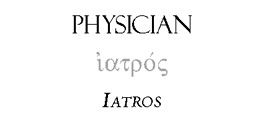From Praying the Names of Jesus Week Five, Day One

The Name
Jesus, the greatest of all physicians, performed more healings than any other kind of miracle. Nothing stumped him — not blindness, craziness, lameness, deafness, or even death. Every ailment yielded to his undeniable power, and every healing served as evidence that his kingdom was breaking into our fallen world.
When you pray for healing for yourself or others, remember that God never sends sickness, though he sometimes allows us to become sick. Indeed, Scripture sees sickness and death as byproducts of sin. And it was to solve the sin problem that Jesus came into the world. When you pray for healing, remember that Jesus is always your ally, always wanting what is best for you and for those you care about.
Key Scriptures
The blind receive sight, the lame walk, those who have leprosy are cured, the deaf hear, the dead are raised, and the good news is preached to the poor. Matthew 11:5
Jesus said to them, "Surely you will quote this proverb to me: ‘Physician, heal yourself! Do here in your hometown what we have heard that you did in Capernaum.' " Luke 4:23
***
Monday
His Name Revealed
When John heard in prison what Christ was doing, he sent his disciples to ask him, "Are you the one who was to come, or should we expect someone else?"
Jesus replied, "Go back and report to John what you hear and see: The blind receive sight, the lame walk, those who have leprosy are cured, the deaf hear, the dead are raised, and the good news is preached to the poor." Matthew 11:2 - 5
He [Jesus] went to Nazareth, where he had been brought up, and on the Sabbath day he went into the synagogue, as was his custom. And he stood up to read. The scroll of the prophet Isaiah was handed to him. Unrolling it, he found the place where it is written:
"The Spirit of the Lord is on me,
because he has anointed me
to preach good news to the poor.
He has sent me to proclaim freedom for the prisoners
and recovery of sight for the blind,
to release the oppressed,
to proclaim the year of the Lord's favor."
Then he rolled up the scroll, gave it back to the attendant and sat down...
Jesus said to them, "Surely you will quote this proverb to me: ‘Physician, heal yourself! Do here in your hometown what we have heard that you did in Capernaum.' "
"I tell you the truth," he continued, "no prophet is accepted in his hometown. Luke 4:16 - 24
Jesus, you are the great Physician, able to heal both body and soul. I praise you because no disease is beyond your healing power and no sin beyond your saving grace. Today I pray that you would heal me and make me whole and help me to live in a way that expresses my faith in you. Use me, Lord, to advance your healing work so that many others will learn of your compassion and your power.
Understanding the Name
The ancient Egyptians were among the first to practice medicine, learning how to fill teeth, stitch up wounds, set broken bones, and perform various kinds of surgery. Later on the Greeks developed a more empirical approach to medicine, while the Romans grew wealthy by developing specialties that focused on treating eyes, ears, teeth, or various gynecological disorders.
Though the Jews used physicians, they believed healing came ultimately from God. He was Yahweh Rophe, "the Lord Who Heals." What's more, their Divine Healer had given them a set of laws that included hygienic practices that contributed to their health and to their staying power as a people.
Also, according to the Talmud, an authoritative collection of Jewish writings, every city had its own doctor who was licensed by city officials. The temple in Jerusalem also had its own physician, assigned to take care of the priests. Jesus' healing miracles clearly reveal him as the greatest of all physicians. While he emphasized the importance of faith in the healing process, the Gospels do not support the teaching that a lack of healing always indicates a lack of faith. And though the New Testament sometimes directly links individual sin with sickness, it does not presume that every sickness is caused by individual sin. Rather, human beings become ill as the result of living in a fallen world.
It is interesting to note that the author of Luke's Gospel, which recounts many of Jesus' healing miracles, was himself a physician (see Colossians 4:14).
Studying the Name
- Why do you think Jesus responded to John the Baptist in the way he did in Matthew 11:2 - 5? What does this say about his purpose for coming into the world?
- Do you think Jesus still heals people today? Why or why not?
- Have you experienced God's healing power in your own life? If so, how?
- In Luke's Gospel, in a rather roundabout way, Jesus refers to himself as a "physician." Yet his words indicate that his work as a physician would not always be well received. What do you think he meant?
For more from Ann Spangler, please visit her blogspot on Christianity.com. And be sure to check out Ann's newest books on AnnSpangler.com. To hear more from Ann Spangler, sign up today at annspangler.substack.com.
Meet your spiritual ancestors as they really were: Less Than Perfect: Broken Men and Women of the Bible and What We Can Learn from Them.










